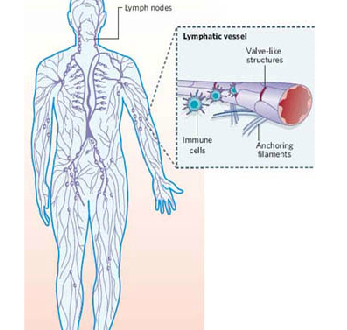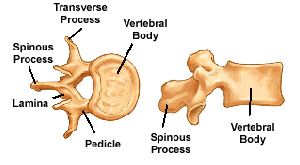LYMPHATIC SYSTEM (FOR NEET, SSC & UPSC)
The lymphatic system is a part of immune system; it helps the body to fight against disease and infection. The lymphatic system includes a network of thin lymphatic vessels that branch like blood vessels into tissues throughout the body.
Lymphatic system also removes parts of the microbes that are left as a result of other immune system attacks. In case of infection, lymph nodes swell.

LYMPH
Lymph is a clear, watery fluid that surrounds body cells and flow in a system of lymph vessels that extends throughout the body.
Lymph differs from blood, but it has close relationship with the blood system. Lymph fluid does not contain erythrocytes or platelets, but it is rich in 2 types of leucocytes- lymphocytes and monocytes. The liquid part of lymph is similar to plasma but it differs in that it contains less protein. Lymph actually originates from the blood as fluid, filters out of tiny blood vessels into the spaces between the cells. The fluid that surrounds the cells of the body is called interstitial fluid.
Interstitial fluid passes continuously into specialized thin-walled vessels called lymph capillaries. The fluid in the lymph capillaries passes through larger lymphatic vessels and through deposits of lymph tissues, finally to reach large lymph vessels in the upper chest.

FUNCTIONS OF LYMPHATIC SYSTEM
There are various functions of the lymphatic system. One is to act as a drainage system to transport needed proteins and fluid that have leaked out of the blood capillaries back to the blood stream via. the veins. In addition, the lymphatic vessels in the intestines absorb lipids from the small intestine and transport them to the blood stream.
Another important function of the lymphatic system is related to the immune system: the defense of the body against foreign organisms such as bacteria and viruses. Lymphocytes and Monocytes, originating lymph nodes and organs such as spleen and thymus gland, protect the body by producing antibodies or by phagocytosis.


Q.1. Lymph has slightly different composition than:
- Blood
- Protoplasm
- Neuroglia
- Nucleoplasm
Ans. a
Q.2. Lymph is rich in:
- Leucocytes
- Monocytes
- Both
- Basophils
Ans. c
Q.3. The fluid that surrounds the cell is known as:
- Interstitial fluid
- Neuroplasm
- Neuroglia
- Cytoplasm
Ans. a
Q.4. Lymph does not contain:
- Leucocytes
- Erythrocytes
- Thromocytes
- Both b and c
Ans. d
Q.5. _________ gets swollen at the time of infection.
- Leucocytes
- Lymph vessels
- Lymph nodes
- Immune system.
Ans. c
Q.6. Lymph contains less protein in comparison to:
- Blood
- Plasma
- Serum
- Platelets
Ans. b
Q.7. Lymphatic system is related to the:
- Nervous system
- Respiratory system
- Immune system
- Digestive system
Ans. c
 IT2EDU Empowering Education Through Technology
IT2EDU Empowering Education Through Technology


